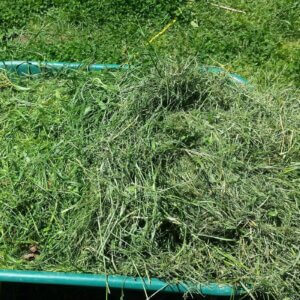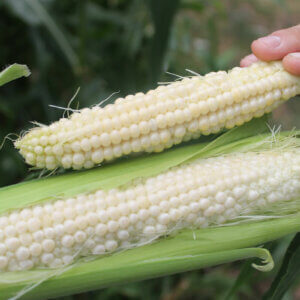While the cost of farm fresh and organic eggs continues to rise, it has become increasingly popular to keep and raise chickens in backyards. Chickens and roosters are manageable in comparison to other farm animals, and the continuous production of eggs is a big selling point.
Whether you already have your own flock or are debating one in the future, consider adding a few guinea fowls to the group for more reasons than one.
Guinea fowls, commonly known as guinea hens and guineas, are a low-maintenance but beneficial addition to your coop and backyard. Guinea fowl flocks can be found in nature among the rhinos of Africa. The birds eat ticks and other insects from the skin of their rhino friends, and the large beasts serve as protectors for the birds who could be targeted by larger predators.
Read on to learn more about the guinea fowl and why you should consider raising them alongside your chickens.
1. Natural Pest Control
Guinea fowls love to snack on bugs, insects, vermin, and other pests that may be plaguing your backyard and animals. They are particularly fond of the dreaded tick which is increasing in numbers around the United States and can be incredibly dangerous to humans and animals.
This fact alone has encouraged people to find a space for guinea fowls in their yard. Managing ticks without harsh chemicals can be tricky and is sometimes ineffective.
Additionally, guinea fowls do not scratch and forage for insects the same way that chickens do. Chickens aggressively scratch and dig in soft areas in search of insects that live beneath the earth which can be problematic for gardens and flower beds.
Related Post: Raising Guinea Fowl
Guinea fowls, on the other hand, tend to forage for insects and bugs that are above ground which causes less damage. Weeds and flowers are also a larger part of a guinea fowl diet which requires them to scratch and dig less. So in general, guinea fowls are less likely to damage your garden or landscaping while foraging.
Guinea fowls eat:
- Ticks
- Crickets
- Mice and other small vermin
- Flies
- Small reptiles, such as snakes and scorpions
2. Eggs
Guinea fowls do not lay eggs as often as chickens, but they do lay heavily at different times throughout the year. Guinea fowls lay eggs regularly from spring to fall. They can produce anywhere from 80 to 150 eggs per year. In comparison, chickens have been known to produce approximately 320 eggs per year.
While guinea fowls do produce eggs less regularly than chickens, the eggs tend to be richer in flavor, making them a delicious addition to the homestead.
3. They Will Be Backyard Protectors
Utilizing their loud, alarm-like cry as a deterrent to predators, guinea fowls can act as backyard protectors for your chicken flock. A small group of guinea fowls will often make such a ruckus that their owners are alerted of danger right away. This is the perfect opportunity to scare away unwanted visitors.
Related Post: 7 Chicken Predators And How To Protect Your Flock
Unfortunately, a flock of chickens is often an easy and frequent target when it comes to predators. From low flying hawks to foxes, minks, weasels, raccoons, and even stray dogs, there’s no shortage of predators when it comes to chickens. They are not flyers and they aren’t very fast. Additionally, chickens will roost at dusk which is when many predators make their move.
4. They’re Helpful In the Garden
Guinea fowls are natural weed killers and fertilizers. They will have your yard thriving in no time.
Tips For Integrating Guinea Fowls With Your Chickens
Guinea fowls are naturally dominant and will likely take over the coop by asserting themselves in any altercation. Guinea fowls are different from chickens, but the males will still fight with roosters, especially during mating season. This shouldn’t dissuade you from adding them to your flock.
Follow these tips to integrate the two species with minimal problems:
- Raise the birds together as small chicks. The two species will acclimate early on and get used to each other.
- It’s best to not let the dominating guinea fowls outnumber your chickens. The chickens could feel a constant threat and become overstressed.
- Unlike chickens, guinea fowls can actually fly. Keep that in mind when building or purchasing a coop.
- Owners cannot raise one guinea fowl alone even in a flock of chickens. They are naturally social animals and will likely die if they are secluded from other guinea fowls.
- You may want to have separate coops while allowing the two species to interact during the day or around the yard.
- Introduce the animals slowly, perhaps one at a time, to avoid too much stress.
- Guinea fowls do not like to be moved from coop to coop. Moving the birds too often could encourage them to wander off.
Freelance writer Marlene Ridgway, grew up in rural West Virginia cooking, keeping chickens, stacking firewood, picking blueberries, and gardening.










































Greetings! I have quite a dilemma in my hen house. Started out with 3 guinea chicks and 7 pullets. A racoon got 1 of the guinea and 2 of the pullets first night out in the coop. So, down to 2 and 5. All chicks bought same day and are now approx. 3 months old. 1 of the guinea’s has gotten downright vicious with the pullets, picking a different one every day and going after it like no tomorrow. The other guinea is peaceful with everyone. She is the quieter of the two. Coop is decent sized and fenced in area is approx. 6 by 8. Let them out to free range a couple days ago and even while out and about the aggressive guinea still went after the chickens. Hubby is ready to shoot aggressive guinea. I have no way to separate them long term, currently aggressive one is locked in coop so hens and calm guinea can relax for a bit. If something were to happen to “Gabby” the aggressive one would the other be okay just hanging out with the chickens?
Don’t believe everything you read on the Internet folks. We have an 11 year old Guinea who has lived with a flock of chickens his entire life up until 6 months ago when he met his first guinea friend.
I’ve had one Guinea living with my 15 chickens for 7 years, and he is doing great. He’s the leader of the pack and I’ve even seen him mating with his favorite hen.
I have 20 chickens and 7 guineas but the fight is missive especially for the dominant male Guinea, hence i have just separated them because most chickens became stressed and lived in fear.
“Introduce the animals slowly, perhaps one at a time, to avoid too much stress.”
This worked terrible for us with Guinea Fowl. We introduced one chick at night and they did fine. Next day while free ranging however the adults pecked at it so much it ran into the woods crying and hid in a pile of leaves for hours.
Later that day I let the other 9 chicks out all at once, the one came back, and if any of them got pecked they’d just run to the other chicks.
I have 2 male Guineas nothing is getting in my coop but lately I’m fining my hens dead. My guineas are very very aggressive